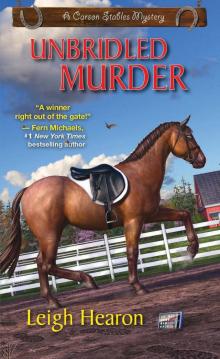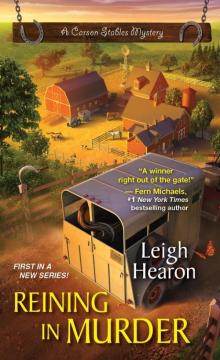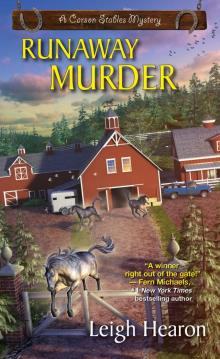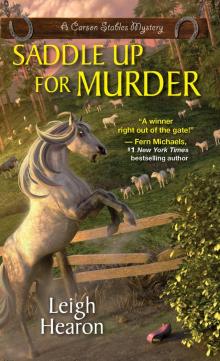- Home
- Leigh Hearon
Reining in Murder Page 2
Reining in Murder Read online
Page 2
Annie remembered this as she forced herself to breathe in and out—long, slow breaths that belied how she felt. After counting to a hundred, she slowly turned her eyes toward the bay. Every time the horse passed by her, Annie focused on the same spot on the horse’s hindquarters. She did not move. No one in the outer circle said a word.
What seemed like a thousand laps later, the bay’s right ear made an infinitesimally small twitch toward her.
Annie immediately took a small step backward and cocked her head to the left. The bay wheeled around and came to a sliding stop. The change was so abrupt that everyone in the circle involuntarily took a step back.
Annie put up her hand to signal her need for silence. The bay remained still, shaking, his breathing heavy and ragged as sweat poured off his coat. Annie met his gaze for a good, long moment, then angled both her body and her outstretched arm to the left.
The bay half reared and lunged in the other direction, continuing its frantic race around the human fortress. Annie continued to stand motionless. This time, the cue that she was looking for took far less time. Again, the bay twitched its ear closest to her, and Annie responded with a quick cock of her head. The bay wheeled around and stood before her, as if waiting for its next instruction.
Once more, Annie stretched out her arm, which sent the animal back to circling inside the human wall. The bay was tiring, that much was obvious. But its desire to keep running seemed as strong as ever.
Again and again, Annie got the bay to stop, only to send him away. She realized that by now, most of the men keeping the bay hemmed in probably were wondering what the hell she thought she was doing.
Just trying to get through that magnificent, thick skull of his, she thought to herself.
The sixth time the bay stopped, he gave a big, shuddering sigh. Annie sighed back.
And then a miracle occurred. The bay took two tentative steps toward her.
Annie took two steps back.
Behind her, someone within the circle involuntarily groaned.
“Shut up, Jake,” Dan Stetson hissed through his teeth. “She knows what she’s doing.”
Bolstered by this unexpected praise, Annie wanted to flash her appreciation toward her friend but dared not take her eyes off the bay. She waited. And breathed.
The bay took two more steps toward her, this time, with less trepidation. Annie promptly took two steps back.
Now silence reigned all around them. Only the soft breeze in the overcast February early morning sky accompanied the strange dance between Annie and the bay.
The next time the bay took two steps forward, Annie stood still. She waited to make sure the bay wasn’t going to move, then slowly turned and began to walk away.
When she was within a few feet of the human circle, she stopped.
“Is he there, Dan?”
“Right behind you.”
“Then open up, boys, because we’re coming through.”
The deputies in front of her promptly stepped back, causing the rest of the circle to do the same.
Annie calmly walked through the eight-foot space now given to her. When she’d gone a good twelve feet beyond the crowd, she stopped again. The slow clip-clop of horseshoes followed in her wake. When she could feel the bay’s breath behind her, she slowly reached up and took the lead rope.
“Hello, beautiful,” she said.
She stroked his shiny, wet neck a few moments, then said in an even voice, “Get someone to drive my rig back, would you, Dan?”
Annie then took hold of the lead rope and started walking.
“You’re not going to walk that horse all the way back to your place, are you?” Dan sounded incredulous.
“Yup,” Annie replied. “See you later.”
The deputies watched Annie and the bay’s backs as she and the horse continued down the country highway, past Annie’s Ford, where Wolf stood up in the cab, dumbfounded that his mistress would leave without him, and into the fog.
“Oh, and wait about a half an hour, would you, Dan?” Annie’s voice floated back to them. “I’d hate to have to do this all over again.”
Overhead, a few light sprinkles began to fall. It was going to rain.
“Come on,” Annie said to the bay, as she zipped up her parka. “It’s time to get you home.”
CHAPTER 3
MONDAY MORNING, FEB. 22ND
Something was tickling her nose. Like a delicate feather, Annie thought drowsily, before she got the full onslaught of tuna breath. She opened her eyes and found herself under the calm and steady gaze of Max, whose white whiskers brushed against her face.
“What’s up, pussycat?” She clutched Max firmly to her chest. The black-and-white kitten melted in her arms and rewarded her with a deep, strong purr. Annie trained all her cats to be docile on command. Not exactly an easy task—in fact, starting a stallion was, in some ways, easier than getting a cat to snuggle at will. Smugness at her prowess as Cat Whisperer overtook Annie for one, small instant before she remembered the events of just a few hours before.
Tossing Max unceremoniously aside, Annie sat upright and looked at the bedside clock—9:00. Hell’s bells! Had she been asleep that long? She leapt out of bed, ripped off her sleeping sweats, and stepped into her Lees. The clothes she’d worn earlier still lay in a wet heap on the bathroom floor. The sprinkle that had started Annie and the bay on their long walk home had turned into a downpour within minutes.
The only good thing about the rain, Annie had thought sourly at the time, was that it at least cooled down the bay’s red-hot heat. The bay, in fact, seemed to like the spontaneous shower. Annie did not. It was pitch-black; dawn was still a good two hours away. The three-mile trudge home seemed endless. After telling the bay—whom, she noticed, was an exceptionally polite listener—her life story, Annie and the bay finally rounded the last bend, and her farmhouse was in sight.
So was her rig—Dan had taken the parallel road to her farm and neatly parked it in front of the stables. A light already was glowing from inside her kitchen, accompanied by Wolf’s insistent barking that told her his feelings: it was high time she’d come home. Annie wasn’t surprised Dan had managed to get Wolf inside the house; she kept a spare key in the most conspicuous place possible: under the doormat.
Annie had led the horse to one of her spare stalls, rubbed him down, applied Schreiner’s, her tried-and-true herbal horse tonic, to the few nicks she saw, and was pleased to see that her observations during the walk home seemed to be accurate—the bay had walked away from disaster with hardly a scratch. She was also pleased to see the bay obediently lower his head so that she could put on a cooling-down blanket. By then, the first glimmer of light had made its way to the stable windows, so Annie decided to give everyone an early breakfast, starting with Trotter. So amazed that Annie had fed him, the superior member of the equine family, first, he practically forgot to bray.
Finally, Annie allowed herself to trudge back to the farmhouse, soak in a hot tub with a cup of tea, and fall into bed.
Had it been a few hours earlier, the tea would have been scotch.
When Annie had acquired her farm, she’d built her stables within easy viewing distance from her bedroom window. She liked falling asleep watching the horses standing in the paddock adjoining the stalls, knowing they would soon be inside, crunching on their last bits of hay. She never locked the herd in their stalls at night; despite Trotter’s opinion of them, Annie knew her horses were smart enough to come in out of the rain should they so desire. By early morning, she knew she’d find them all in their stalls, anyway, for their requisite power nap. Annie envied her horses for a lot of reasons, but high among them was their ability to appear wide-awake and sassy every morning after only thirty minutes of REM sleep while properly lying down.
Now she saw all four of her horses and Trotter waiting impatiently at the paddock gate. Normally, Annie would have turned them out two hours before this.
Wading in fat wool socks to the kitchen door, she
tugged on her muck boots and, with Wolf at her side, walked to the gate to let her horses out of captivity. Sam, her pinto, looked at her reproachfully as she came nearer.
“Oh, bite me. It’s not that late.”
Trotter brayed back. No interpretation needed. Oh yes, it IS.
Opening the gate to the first of two ten-acre pastures, Annie watched with pride, as she did every morning, at the five beautiful beasts that had entrusted her with their lives.
Bess, her ancient Morgan, was Annie’s first horse, and was now entering an elegant maturity that Annie hoped to match when she was the same age. She’d taken in Bess after a childhood friend, thrilled about her acceptance to an East Coast university but distraught at the prospect of selling her horse, had begged Annie to care for the animal until she returned. That was fifteen years ago. The friend had never come back to the Olympic Peninsula, but Annie hadn’t minded. She seldom rode Bess anymore, but when she did, Bess still had the heart, if not the stamina, of a yearling.
Sam, her pinto, was her working horse. With Annie on or off his back, the two of them had reached a level of equine-human telepathy that was uncanny.
She’d never forgotten the ad for Sam she’d found chalked on the Cenex board seven years before: “Free to good home: Gelded pinto, fifteen hands. If you don’t take him, the glue factory will.” Sam was eating her pasture grass by that evening. His previous owner had described Sam as aggressive and unpredictable. Annie was herding sheep with him within two months and loved him for his endearing and steadfast desire to perform for her.
Baby, her three-year-old saddlebred-in-training, had belonged to a local rancher, who thought she wasn’t “pretty enough to keep.” Annie thought the guy was nuts but refrained from saying so when she offered to “take the horse off his hands” for a few hundred dollars. Even her equine vet, Jessica Flynn, who wasn’t easy to impress, had agreed.
“That horse is just criminally cute,” Jessica had muttered the last time she’d administered vaccinations at the farm. The little horse knew her place in the herd—somewhere lower than Trotter—but she had plenty of spirit, and Annie was sure that she would be a superb trail horse in time.
And then there was Rover, so named because the quarter horse had an extraordinary mouth that could open a gate faster than a human. Usually, he went no farther than the nearest clump of fresh pasture grass, but it was a trait Annie wasn’t sure other horse owners would love as much as she did.
Annie had adopted Rover three years ago during one of her jobs as part of the Horse Rescue Brigade in Suwana County. She and Dan Stetson had started the brigade twenty years ago, after Dan came across a farm near Squill River with four of the most despondent, malnourished horses Annie had ever seen. She and Dan had rounded them up over the indignant protestations of the owner, who put down his shotgun only after Dan threatened to arrest him for obstructing the course of justice if he so much as made a move past his front porch.
Years later, Rover had been part of another herd she and Dan had rescued from a derelict owner. Annie had vowed that as God was her witness, Rover would never go hungry again—as long as he didn’t founder.
Trotter had been a gift from an old boyfriend. The boyfriend was long gone, but Annie was fully aware that she now had far more affection for the little burro than she’d ever mustered for the former beau.
Annie swung the paddock gate open, waited a moment to make sure all five pairs of eyes were on her, then nodded to let them know they were free to leave. It was a measure of respect Annie demanded from her herd. When she was eight, Annie had once opened the paddock gate for a friend’s pony, which nearly ran her over in his desire to get to his pasture. She had never let that happen again.
Unlike the others, the bay had spent the night in its stall. The brief introduction she’d given last night of “Sam, meet the bay. Bay, meet Sam,” hardly sufficed to ensure they’d all get along in a common paddock area. In fact, every horse Annie had acquired spent its first week looking over a fence line at its new companions before exchanging muzzle handshakes.
She was curious to see how the bay was this morning. So after watching her herd gallop off toward its favorite grazing area, she turned to the stable and the bay’s stall.
She heard the bay before she saw him, a low, worried nicker that told her he was unhappy about being separated from his new herd, even at this early stage of their friendship. Through the stall bars, Annie saw the bay pacing back and forth, its tail swishing. She could have sworn she saw the horse grimace.
“Easy, boy,” Annie murmured to the bay. “You’re okay.”
Then she noticed the uneaten hay in the feeder, and beside it, the bucket of bran mash unceremoniously dumped on the floor.
“Horses all over the world whinny for that mash.” Annie felt an unreasonable pang of hurt course through her, even while her rational brain told her the bay’s lack of appetite had nothing to do with her culinary skill.
Taking a string halter by the stall, she slipped inside and waited for the horse to approach her. Again, she was delighted to see the bay politely lower its head for her. At least the trauma of last night had not left the bay a nervous wreck. Annie led the bay outside to the stall corridor, where the light was better.
Equine mouth inspections were one of her least favorite tasks—no one wanted one’s fingers mistaken for a carrot. However, there were three healthy mounds of manure in the stall and the water bucket, filled last night, now was barely half-full, so the bay clearly wasn’t colicking. The only other reason Annie could think of for the horse’s poor appetite was its mouth.
She hauled over a mounting block, climbed on top, and started to run her fingers along the corner of the bay’s mouth to see if it would open up. The bay abruptly tossed its head, narrowly missing Annie’s own. She hurriedly removed her hand and got down from the block.
“And now, Plan B,” she told the horse.
Tying the lead to a stall bar, Annie went into her tack room and retrieved a handful of carrots.
“How about these?” she asked. “They’re organic, if you care.”
The bay sniffed at the carrots, and snapped at the end of the one closest to him. He jawed uncomfortably for a few seconds, then spit out large chunks of bright orange and emitted a tortured whinny.
“Got it. Why don’t you take a nice constitutional in the paddock while I make a call?”
She led the bay to the paddock, now deserted. As soon as the gate opened, the bay broke loose from the lead rope, broke into a gallop, and raced around the fence line, loudly conveying his desire to be with his companions, now out of sight. Annie raced after him and grabbed the end of the lead rope, snapping it to get the bay’s attention.
Again, she saw that split second sliding stop. She walked slowly and deliberately up to the bay.
“That’s the second time you’ve done that in less than six hours. Aren’t you getting tired of repeating yourself?”
Annie quickly unloosed the string halter and stepped back. The bay resumed its race around the paddock, but steered clear of her.
“Well, at least I can report that his lower extremities are working fine,” Annie muttered. Heading back to the tack room, she picked up the phone and called Jessica.
“Hi, Annie,” Jessica said after Annie had said hello. “What’s up?”
“I have a thoroughbred gelding rescued from a turnover last night who’s shunning my world-famous bran mash.”
A high-spirited laugh rippled through the phone line. “And you’re calling me to see if I’ll trade recipes?”
“I wish. I’m pretty sure it’s something to do with his teeth. No external injuries. He’s pooping and drinking—just not eating. And, for the record, he didn’t like my farm-fresh carrots, either.”
There was a silence on the other end. Annie knew that Jessica was consulting her electronic date book.
“Well, today isn’t good, but then, it seldom is. Let’s see, I think I could switch a barn call to later this afterno
on and come by in an hour or so. Does that work?”
“Thanks, Jessica. He’s a beauty. High-spirited, but a real looker.”
“Just my type. See you in an hour or so.”
Annie knew that the “or so” was the reason horse owners had a special name for veterinarian calls: “vet time.” In Annie and most every other horse owner’s opinion, vets worked at least twice as hard as human doctors and knew twice as much. They spent their lives on the road, driving from one barn to the next, never knowing exactly what lay before them on the other end. A simple checkup might morph into a lengthy diagnostic workup. The delivery of a foal might result in emergency surgery. Or worse.
Still, she had no doubt that Jessica would arrive as soon as she was able, but certainly not before Annie had time for a late breakfast. She had about an hour to stew about the unfairness of rescuing a horse that didn’t like her cooking and was going to cost her, at least up front, a pile of money before being sent on its way.
“Come on, Wolf,” she said. “Let’s get some chow.”
As Annie and Wolf strolled up the slope leading to her back door, she noticed a familiar Suwana County patrol vehicle parked in her driveway. Dan. She picked up her pace, anxious to hear the news and have the chance to kvetch to someone other than her dog about the bay’s emergency care. Wolf apparently was tired of her conversation, too, because he bounded away from her to greet Dan first.
“Morning, Annie,” Dan said from the front seat of his car, where Wolf now had his big front paws on his lap. Dan tipped his hat at Annie. Dan insisted on tipping his hat to every woman he encountered. It was an endearment that never failed to charm the ladies—except Annie. She knew him too well.

 Unbridled Murder
Unbridled Murder Reining in Murder
Reining in Murder Runaway Murder
Runaway Murder Saddle Up for Murder
Saddle Up for Murder